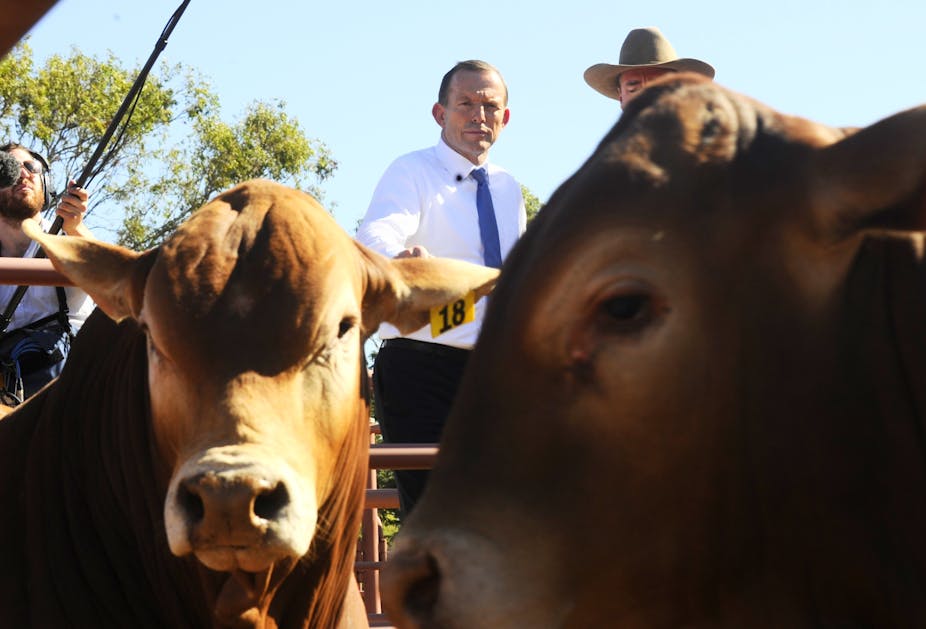Australians should not be alarmed but pleased at the current Indonesian proposal to invest in cattle production in the north of Australia. It demonstrates a renewed confidence in Australia’s ability to provide cattle for the Indonesian market, currently under-supplied following the quotas imposed on imports after the 2011 Indonesian slaughter expose.
It also shows the Indonesians have plenty of good business sense: to deny Australia, one of the largest beef exporters in the world and right on their doorstep, access to their markets would be financial suicide. The nearest alternative major exporters are thousands of miles away, in the horn of Africa.
Buying Australian properties when prices are depressed but demand for beef in Indonesia is growing is not just a smart financial move. It could also encourage the Australian government to restore relationships with its major trading partner and neighbour.
And Indonesia could claim increasing self-sufficiency in beef production, a goal that has been a growing focus since the export ban of 2011. The property purchase by the Indonesian government will only have a small impact on their imports of live cattle, but it could point the way to greater investment by Indonesian entrepreneurs.
The property is expected to use breeder cattle in Australia to produce young cows for shipping to Indonesian feedlots. Until a meatworks is built in the north, it will need a live export trade. Most surveys suggest that the Australian public do not support live export.
The failure of animal welfare activists to stop it has shown how determined the government is to continue the trade, but with increased monitoring of the cattle. Just before the election, Kevin Rudd visited Indonesia to encourage the prime minister to accept more Australian cattle.
However, science is increasingly supporting the activists’ cause, demonstrating that livestock experience considerable stresses on the ships.
Ammonia is given off from the excreta of animals. It accumulates through the voyage, irritating the mouth, nose and lungs of the animals.
For a recently-published study, Dr Mat Pines and I travelled to the Middle East on a ship loaded with sheep, measuring their behaviour in high and low ammonia sections of a ship. In the high-level sections, sheep ate, chewed the cud and lay down less. They displayed signs of stress. Follow-up studies confirmed ammonia reduces sheep’s feed intake and weight and also produced adverse reactions in cattle.
More recently, in the Centre for Animal Welfare and Ethics at the University of Queensland, veterinarian Eduardo Santurtun and coworkers found ship movement increases stress in livestock. They found higher and more variable heart rates, and that sheep had to brace themselves against the sides of their enclosure to keep themselves upright.
Whatever we think about the slaughter practices in Indonesia and the government’s attempts to monitor and improve them, the fact remains that ship journeys are stressful for livestock. Animal welfare is sacrificed in the name of providing a fresh product for the Indonesian market.
Indonesians producing cattle in Australia would be bound to Australian standards, both in this country and during the ship journey. The Export Supply Chain Assurance Scheme the government introduced after the 2011 live export troubles aims to guarantee compliance with World Animal Health Organisation standards and the traceability of Australian cattle.
However, these standards, even if they are enforced, are not enough to guarantee the welfare of cattle born into the system. They must ensure basic animal rights are observed, such as stunning before slaughter and avoiding unnecessarily long journeys in stressful conditions. As the sea journey is inherently stressful, everything must be done to persuade the Indonesian people to eat beef that has been killed in Australia.
Barnaby Joyce, as the new agriculture minister, will try to stop Indonesia buying land, but not because he is concerned about animal welfare during live export.
He argues that it is a food security issue, yet Australia has no problem meeting the food needs of its citizens. Even if overseas ownership spread rapidly, in the event of any threat to security, land owned by foreigners from hostile countries would quickly be nationalised.
In an unstable world, particularly as tension rises between Muslim and Christian countries, we need to welcome every opportunity to forge strong links with our Muslim neighbour. Australia has shown itself to be a modern country in embracing multiculturalism. Will it see the opportunities offered by welcoming its neighbours to help it utilise one of its most precious commodities – land?
In this era of globalisation, it seems inevitable that rapidly growing needy nations will buy into those nations with surpluses or desirable products. The Russians buy houses in the heart of London, the Chinese buy mines in Africa.
Why shouldn’t the Indonesians buy land in the north of Australia?

